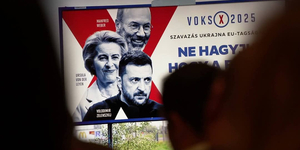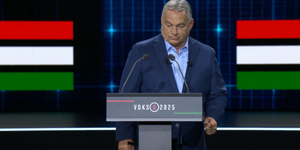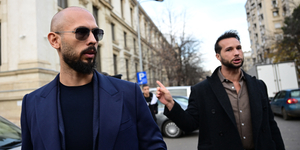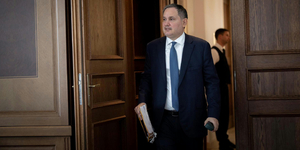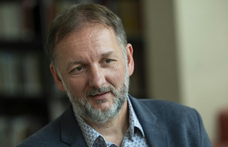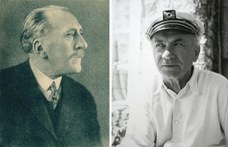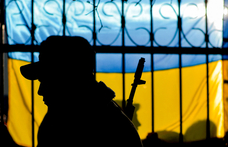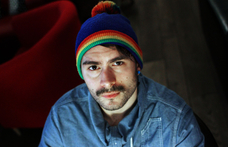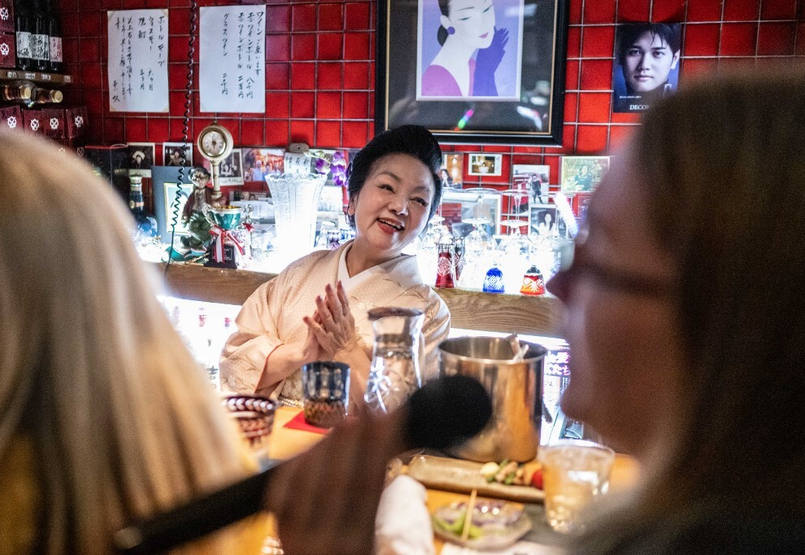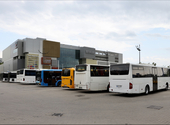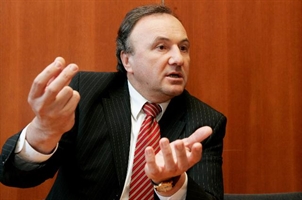 © Túry Gergely |
Thus, Csaky ended up in the textile factory in Leva. Working as a chemical engineer, the only public affairs role open to him was in the single authorised Hungarian cultural organisation, Csemadok. In the upheaval of the regime change, he was a founder of the Independent Hungarian Initiative (FMK), which was, he says, "anti-communist in the beginning, later liberal." He continues: "I realised at the beginning of 1990 that the masses were of a Christian Democrat persuasion, so I joined the Hungarian Christian Democrat Movement." His calculation paid off. By 1991, he was vice-president of the movement, which had turned into a political party, and he served as deputy prime minister in the Dzurinda government that was elected in 1998. When the various political movements joined together to form the Hungarian Coalition Party (MKP), he was once again made vice-president. As his political career flourished, his essays and commentaries were published in six volumes. Last year, the coalition lost power. At the last minute, he announced his attention to run for the presidency of his party, and defeated Bugar, the previous president, after a brief campaign. "I came fourth in the Slovak bodybuilding championship once, and I continue to work out," he says. "Sometimes I sit down in front of the piano." He lives in "the most Hungarian part" of the Slovak capital, in the district of Pozsonypuspoki, "where the mayor is Hungarian." His wife teaches mathematics and religious studies. They live with Zsofia, their 17-year-old daughter. "Agnes, who is 26, and Erzsebet, who is 24, both study in Budapest. Katalin, 24, studies in Prague."
You and your one-time ally Bela Bugar go back a long way, but you suddenly turned into his opponent. Could you tell us why you decided to turn against him?
The truth is that my friend Bela told Slovak commercial television a few weeks before the party congress that he would be glad to have a challenger. He mentioned my name. At the time, though, I didn't want to.
But you changed your mind. Are you surprised that Bugar is angry? Especially since your main supporter, Miklos Duray, who is now vice-president of the party, said Bela Bugar was only elected party leader in the first place because of the support of former secret agents?
Unfortunately, it went less smoothly than we wanted it to. But angry words were said on both sides. What Bugar said after the elections clearly reflected his state of mind. I can understand that in human terms. We sat down and agreed to draw a line under the episode.
Let us move on then. Tell us about yourself. What would your father have said if he had seen you become a political leader?
My parents had little time for politicians. Neither do I, I should admit. I'm not proud to be a politician. But life got in the way. They would perhaps have been proud that I became deputy prime minister, but leading the party would not have impressed them.
But what about that arisoratic 'y' at the end of your name? Are you a descendent of the famous Csaky family?
I'm proud that, in the Hungarian Parliament, on one of the columns by the Holy Crown, there is a list of the names of the people who created that building. One of them is Count Albin Csaky, who was president of the Upper House. I told Duray and Bugar, "you will know you are real politicians if your names are also engraved in marble in the parliament building." But he's at most a distant relative. I'm probably from a poor branch of the Csaky family.
And so you lived in Slovakia as a Hungarian. What did you and your family think in 1968 when the Hungarian soldiers of the Warsaw Pact appeared on Slovakia's roads?
I saw tanks, I saw that my parents were worried, that my mother was worried, and she said there might be a war. But now, as an adult, I can see that this was the point when we Slovak Hungarians turned away from the Hungarian sphere towards the Czechoslovak world. Those were watershed days.
You must have felt a similar breakpoint later, when you were a politician. When it came to the power station in Bos, for example. Who did you agree with? In public, at least?
I have a dual allegiance. My culture, my history, my language – they are all clearly Hungarian, but I am the loyal citizen of another state. As far as Bos is concerned, I think both sides handled it badly from the very beginning. For Slovaks, it was always a symbol of breaking away from the Hungarians. But I was unhappy to see how overheated and unjustified the Hungarian approach was. I always thought it would have been possible to find a compromise, but by the time I was in government, it was no longer an option.
What was an option? What were your achievements as a Slovak politician?
I was responsible for human rights. Don't forget that we came to this after the difficult Meciar era, when many were excluded from Parliament, when courts brought strange rulings and when minority affairs were a matter of great tension. I drew up many new laws to stabilise the situation. It's no coincidence that most see this period as one of peace and tranquillity. We gave real powers to local authorities. And farmers always got their money on time.
Hungarians in the mother country often laugh at the Slovak Hungarians' strange accent. At the same time, we recently found out that your predecessor's popularity among Slovaks was partly due to the fact that he spoke Slovak with a characteristically Hungarian accent. Of you it is said, that you speak an accent-free Slovak. Is this part of a new political image?
Maybe I'm good at languages. I'm good at catching the rhythm of a language. But I don't speak good Slovak just so people should take me for a Slovak. Everyone knows I'm Hungarian. It's important to speak correctly, because that will make people take what I say more seriously.
So you've assimilated in this respect. And as the father of four girls? Do you want them to be Hungarians?
It's a mistake to force a choice on anyone. But my daughters were raised as Hungarians. Two of may daughters have Hungarian boyfriends. If they chose differently, I would accept that, but I would tell them I wanted their children to speak Hungarian as natives. Nowadays it's essential to be multilingual.
ANDRÁS LINDNER - ZOLTÁN HORVÁTH

